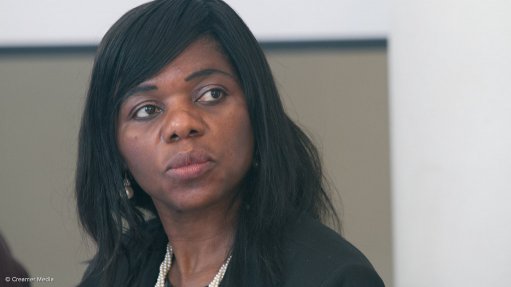
Law Trust Chair in Social Justice at Stellenbosch University Professor Thuli Madonsela.
Photo by: Creamer Media
"If we're going to fight corruption, there should be no holy cows," says Law Trust Chair in Social Justice at Stellenbosch University, Professor Thuli Madonsela.
She told the Pavocat-Stellenbosch Academy Counter-Corruption Summit that fighting corruption meant tackling the "mafia" culture in South Africa, which deemed some people untouchable.
But more than holding the corrupt to account, South Africa would need to focus on raising "people with the right values".
"It's everyone's duty to combat corruption. There are roles for the government, the international community, business and civil society," she said.
"Part of the problem is that we focus on accountability. You've got to look at the root causes... If we applied all of the laws, we would do better. But if we breed people who are not corrupt, we would do even better."
The summit is a public event to engage the social partners of counter-corruption.
Justice Minister Ronald Lamola told the summit the government had made "tangible progress", including the National Prosecuting Authority's Investigating Directorate enrolling in over 20 matters, charging 65 accused, and with the Asset Forfeiture Unit (AFU) obtaining freezing orders to the value of R5.5-billion.
He added that the Specialised Commercial Crimes Unit had finalised 380 cases, with 344 resulting in convictions.
"The number of government officials convicted of corruption increased by 38.4%. The NPA's performance in private sector corruption prosecution improved by 39.5%," he said.
Lamola said 589 individuals had been convicted of corruption, of which 380 were government officials.
Constitutional Court Justice Mbuyiseli Madlanga said the judiciary only played an "ad hoc" role in dealing with corruption, because it could only deal with cases "as and when they are brought before the courts".
He described the number of cases appearing before the courts as "a trickle".
The chairperson of the standing committee on public accounts (Scopa), Mkhuleko Hlengwa, said at the heart of corruption in South Africa was the government's tender process.
"I do not consider tendering in its current form in South Africa as business. It is merely a facilitation of money, often at escalated costs, and no establishment of skills transfer, business growth and job creation," he said.
"Unless there is a deliberate effort to reconfigure the tendering space and its purpose, the cancer of corruption will continue to prevail as a daily lived reality for the majority of our people and to the detriment of the economy. We must build up the state's own capacity and, where it falls short, engage in tendering."
Hlengwa said corruption flourished not because legislation was lacking, but because of a lack of political will and patriotism.
"It is not the absence of laws, rules, legislation or institutions, it is the absence of political will and … patriotic outlook, to put country ahead of self. If the country doesn't come first in what you do, most likely you are aiding and abetting corruption."
However, measures could be put in place at a parliamentary level to improve the oversight of the executive, Hlengwa said.
He suggested that study groups, which he believed compromised oversight and accountability, be scrapped.
Hlengwa also lobbied for more resources at Parliament, saying that committees were often understaffed.
"There must be a deliberate effort to fully resource Parliament, otherwise executive becomes 'runaway train', he said.
Lamola added that the governing party would be implementing resolutions to fight corruption.
"When leading figures of the movement are implicated in graft and scandal, it has a direct bearing on how citizens view our constitutional democracy. Over the years, it has become evident that it is no longer adequate to invoke principles, such as innocent until proven guilty, society now demands a higher ethical standard. If the governing party upholds very high ethical standards, it filters across all spheres of society," he said.
Madonsela said corruption was a "gross injustice", as it "distorts the playing field" and "equals unfairness".
She added that corruption started with the abuse of entrusted power for personal gain, in small ways.
"Corruption is a threat to democracy, the rule of law and peace. Where there is injustice, there can't be peaceful existence," said Madonsela.